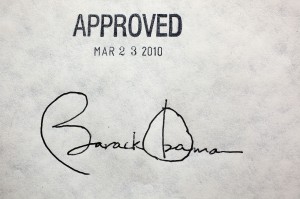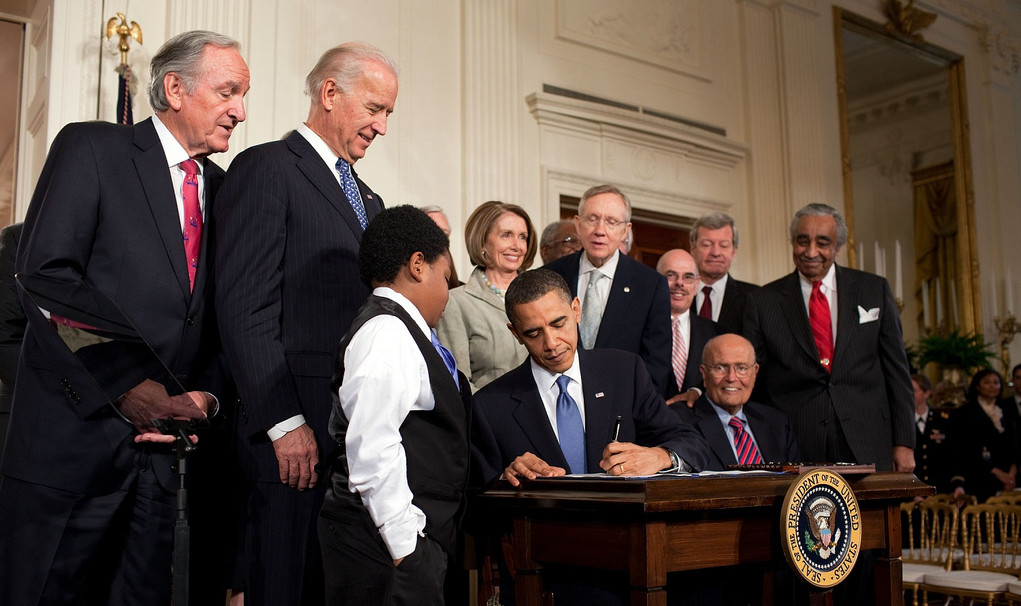When people do hold opinions about the Patient Protection and Affordable Care Act (ACA), they tend to be strong ones. The ACA, more commonly known as Obamacare, inspires heated debate across the political spectrum. This point was interestingly illustrated this month when late night talk show host Jimmy Kimmel decided to ask average Americans what policy they agreed with the most – Obamacare, or the ACA. Many people preferred one identical plan to the other, due a litany of factors including the partisanship of the issue and the instant connotations brought to any piece of legislation containing Obama’s name. Though the interviews on Hollywood Boulevard were hilarious, and illustrated the necessity of an informed voting public, they also highlighted another important aspect of the health care debate, namely that it lacks detail and facts. Short-term political goals have been given precedence over the long-term good of the American people. Both Democrats and Republicans have cheapened the debate for their own gain, leaving many citizens confused, misinformed and ultimately worse off.

Sadly, this style of discussion is making people forget that there are compromises both sides can make without betraying their core principles. It is possible to imagine a version of the Affordable Care Act that could appeal to Republicans and Democrats alike, as proven by Mitt Romney’s governorship in Massachusetts, which birthed a plan similar to the ACA – snidely renamed Romneycare during the 2012 elections. The people interviewed by Kimmel, whether supportive of the ACA or not, seem to intuit the possibility of different solutions to the same problem, implying that there is bipartisan will to act on the healthcare issue. The poll that inspired Kimmel’s interviews shows that Americans actually approve of the individual proposals of the ACA, but are reluctant to embrace them under the blanket term Obamacare. Republicans and Democrats alike overwhelmingly support giving tax credits to small businesses to buy insurance, creating health insurance exchanges and extending dependent coverage. Where the fault lines seem to appear is over payment of these proposed benefits. Only 37% of Republicans, as opposed to 80% of Democrats, favor an increase in Medicare payroll tax on upper income brackets. The individual mandate (the mandate that would compel individuals without insurance to buy it) finds far less support among voters for both parties – only 55% of Democrats and 21% of Republicans support it. Because of the bipartisan support otherwise for much of what Obamacare entails, the GOP would be better off shifting public debate specifically towards what we actually disagree on (taxation) or what we both hate (the mandate), rather than the evils of Obamacare as a whole. Their short-term goal of portraying every aspect of Obama’s tenure as a failed presidency makes them unable to pursue the common ground that may exist between the two parties. The increased prominence of the Tea Party within their own ranks, and their staunch resistance to anything that smells of expanded government surely doesn’t help the lawmaking process either.
The debates that have raged since the signing of the ACA – and throughout its Supreme Court challenge and its recent role as the untouchable law that lead to a government shutdown – have done little to inform American citizens about the nuances of the act. The Kaiser poll shows that 57% of Americans still don’t know how the ACA will impact them, and in households earning less than $40.000 dollars (the people who would supposedly benefit the most), this percentage is 68%.
Americans are in fact less informed about the act now than they were 3 years ago. This is reflected in the nearly 10% drop in awareness about the act’s tax credits to small businesses and subsidies for individual insurance, both of which are popular across party lines. Knowledge of the areas that hold bipartisan support is thus declining. How does the American public unlearn information it has previously absorbed? What happened?
The simple answer is that the debate has been framed not in the spirit of informing the American people, but to either vilify or deify Obamacare. 57% of the people asked in this poll believed that the law created a government-run health plan (which it doesn’t), 47% believed it would allow undocumented immigrants to receive subsidized health insurance (illegal immigrants aren’t eligible), and 40% believe that a the government could make choices on behalf of the families about end-of-life care (this would still be up to the families). These figures suggest that Americans are reading about Obamacare, but that the information they are absorbing is often misleading or outright wrong. Sarah Palin, the former Alaskan governor, propagated the now-popular lie about “death panels” that would determine end-of-life care in a Facebook post on Aug. 7, 2009. After 4 years, a plurality of Americans still believes this rumor to be true. U.S. senator Marco Rubio told a Fox News interviewer that people who “have a doctor they’ve been seeing for the last 15 or 20 years, they won’t be able to keep going to that doctor.” His Fox News opinion piece also noted that “75% of small businesses now say they are going to be forced to either fire workers or cut their hours.” House Representative George Miller, D-Calif., accused Republicans of having waged “jihad” on “Americans getting access to health care.”
On a similarly polarizing note, Democrats dubbed the 2011 Republican proposal to repeal the bill “NoCare.” Terms like “forcing people,” “NoCare” and even “jihad” are thrown around in public debate, without anyone pointing to specifics, leading to not only an uninformed public, but also a misinformed one.

The legislative process itself is even following the path of the debate. By failing to offer tangible alternatives to the law while vocally criticizing it, the Republicans are shooting themselves in the foot. Though their motto is “repeal and replace,” this is not the rhetoric employed by more vocal antagonists of the ACA like Ted Cruz and Marco Rubio. The GOP is clearly divided on the issue of health care, since some representatives focus more on “repeal” than “replace”. For instance, many Tea Party members want to fully defund Obamacare, while more liberal Republicans just want to delay it and use this time to “work through the issues.” Their message is unclear because their opinions are unclear. As former Republican house speaker Newt Gingrich put it when addressing citizens living in Republican-led districts around the country, “I will bet you, for most of you, you go home in the next two weeks when your members of congress are home, and you look them in the eye and you say, ‘What is your positive replacement for Obamacare?’ They will have zero answers.” Responding, Ron Paul, former U.S. representative, told CNN that he “practiced medicine under that alternative, before Medicare and Medicaid, and it wasn’t all that bad.” However, he also added that the “Republicans have never had a clear alternative.” Delaying implementation by a year, “in order to work through the cracks in the Act,” will appear to Americans as an attempt of stopping the Act in its conception, because of the aggressive rhetoric used by both Republicans and Democrats. This is in part because the original demand of the House Republicans was to strip all funding from Obamacare. Their proposed delay therefore seems to be more of an intermission than a solution.
If the Democrats are not better off from this portrayal of the President’s flagship piece of legislation, the Republican Party as a whole is not better off, and the American people are not better off, who wins? The current government shutdown and unconstructive debate is making everyone look bad. In the October AP-GfK poll, Republicans, Democrats, the House, and the president were all increasingly unpopular with the American people. Republicans must ask themselves whether the current system of health care is acceptable, and if it is not, they must devise a plan for what they are going to do about it. Democrats must stop portraying the GOP as a “NoCare” party. They have to shift the message towards bipartisan agreement, rather than simplifying and distorting the debate. A clear, strong and nuanced message on health care is what the American public needs and deserves from both sides of the political spectrum. This short-term politicking is hurting all of us in the long run.
